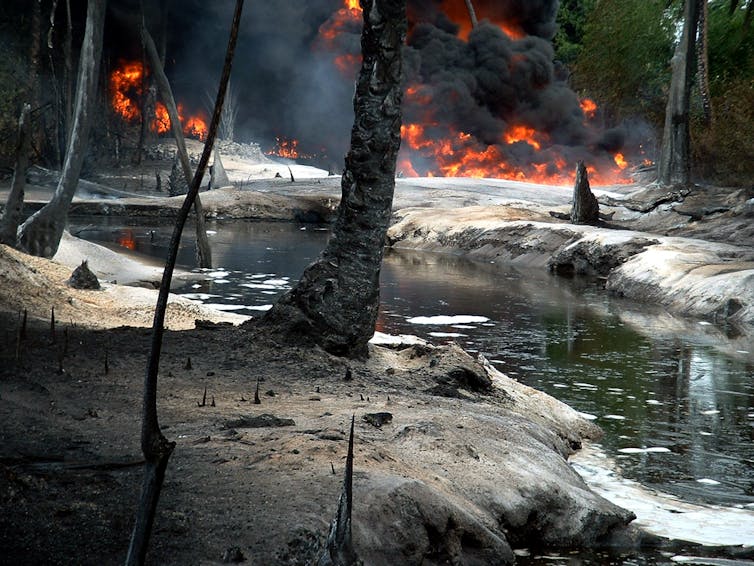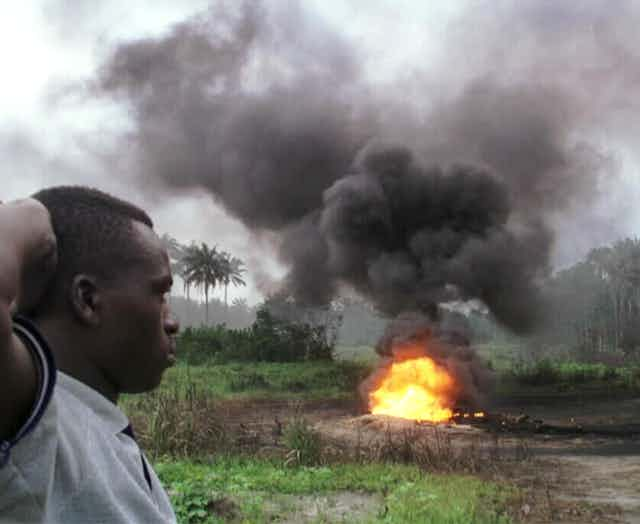The Niger Delta is a region where violence and instability never seems to stop. There are many deeply rooted problems that drive this instability: frequent low-level violence often in the form of oil field sabotage organised by criminal gangs and ordinary citizens, constant-low level, environmental degradation, endemic corruption and a poor socioeconomic environment for the region’s citizens.
Countries that are rich in natural resources like oil or gas are more prone to violence and instability, a situation known as the resource curse. This can disrupt national governance through state and societal corruption.
Nigeria is certainly resource rich: it has amassed more than US$600 billion in oil revenue since the 1960s. But it also bedevilled by weak state institutions and massive, widespread corruption. This leaves areas like the Niger Delta vulnerable despite its resource wealth.
How can this situation be changed?
Mapping a policy path
One possible answer can be based on the policies pursued by other resource-rich countries. Such examples can be found in Bolivia, Norway, Mexico and Venezuela. They have all established government-run non-renewable trust funds to manage natural resource revenue and help insulate their countries from variations in non-renewable energy prices.
These are often funded through a proportion of non-renewable revenue channelled directly into the fund like Mexico, for example. But government mismanagement has caused problems in some cases like in Venezuela.
To combat the massive corruption problem, a Nigerian trust fund would require the involvement of an exterior agency which could run it in partnership with the Nigerian government. The United Nations Development Program represents an obvious candidate. It has experience running development projects, currently totalling more than 3000 in 170 countries.
A steering committee incorporating a majority of UN staff alongside political representatives from Nigeria’s federal and state mechanisms and civic society would help plan and implement socioeconomic development. This must be in tandem with local societal consultation meetings.
Where possible, projects would be awarded to the region’s craftsmen whilst revenue would also be set aside for youth training. The fund would be financed through an excess revenue allocation scheme similar to Mexico. This will generate revenue for development at a level which would not significantly hamper state expenditure in other areas.
The road to the funds potential implementation lies in government efforts at combating corruption. The removal of constitutionally enshrined political immunity clauses for key figures and strengthening anti-corruption agencies and laws would help create a political environment that could potentially be more conducive to the idea of a Nigerian trust fund.
Overall, while this is a bold scheme, the problems in the Niger Delta require a radical solution. It must take into account the destabilising impact of corruption and the ability to deliver sustained socioeconomic for citizens through oil revenue that is utilised for the benefit of wider society and not for the few.

The Niger Delta’s problems
Oil field sabotage is not new in the Niger Delta.
Since the 1960s, development agencies in the Niger Delta have been plagued by endemic corruption. The situation was apparent in the most recent Niger Delta development commission.
These problems show that the amnesty programme cannot be utilised as a penicillin-style policy prescription that could somehow successfully combat these other underlying symptoms. But the ongoing sabotage incidents reflect the failure of numerous federal government development agencies to achieve widespread socioeconomic development for the region’s citizens.
Not much has changed since the amnesty programme was introduced in 2009. Sabotage remains extremely common and frequent in the Niger Delta’s oil fields. Some of the attacks are carried out by organised criminal gangs; others are spearheaded by ordinary citizens of the region. Several factors influence the citizens’ behaviour and animosity towards the oil fields.
These are:
the federal government’s control of natural resources;
the ongoing environmental degradation caused through oil exploitation;
illegal siphoning from oil pipelines; and
the region’s poor socioeconomic situation.
Clearly communities feel marginalised and neglected. Issues from as far back as the 1960s have not been resolved and the amnesty programme did not come with any concrete plans to improve residents’ daily lives.
High unemployment, particularly among young Nigerians, has driven some people to turn to crime and violence. This is their only means of survival and an expression of their anger at the situation.
The Niger Delta’s story sounds hopeless. It’s not. Policy interventions and a series of lessons from elsewhere in the world can hopefully not only address corruption but also tackle the region’s social and economic development issues.

